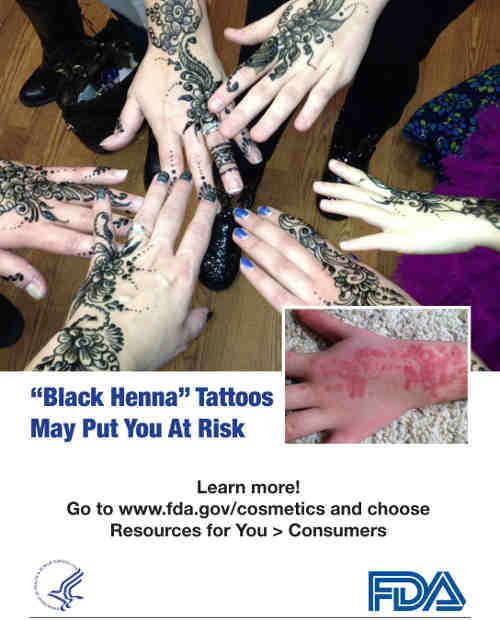Black Henna Tattoos May Put You at Risk

Unlike permanent tattoos which are injected into the skin, temporary tattoos marketed as “henna” are applied to the skin’s surface and usually last two to four weeks.
Henna is a reddish-brown coloring made from a flowering plant that grows in tropical and subtropical regions of Africa and Asia.
For centuries, people have used dried henna, ground into a paste, to dye skin, hair, and fingernails. Henna body art – sometimes also known as mehndi – is still used today around the world to decorate the skin in cultural festivals and celebrations.
[ Also Read: Technology to Help You Remove Your Tattoo ]
However, just because a henna tattoo is temporary that doesn’t mean it is risk free. Today, so-called “black henna” is often used in place of traditional henna and is potentially harmful.
“Henna” may contain other ingredients to make the stain darker or longer lasting. Inks marketed as “black henna” may actually be hair dye or a mix of henna with other ingredients.
The extra ingredient used to darken henna is often a coal-tar hair dye containing p-phenylenediamine (PPD), an ingredient that can cause dangerous reactions in some people.
By law, PPD is not permitted in cosmetics intended for staining the skin. The only permitted use for PPD is in hair dyes, and even then the label must have a cautionary statement.
[ How to Turn Gray Hair Back to Natural Color ]
You may see “black henna” used in places such as temporary tattoo kiosks at beaches, boardwalks, and other holiday destinations, as well as in some ethnic or specialty shops.
While states have jurisdiction over professional practices such as tattooing and cosmetology, that oversight differs from state to state. Some states have laws and regulations for temporary tattooing, while others don’t.
So, depending on where you are, it’s possible no one is checking to make sure that the artist is following safe practices or even knows what may be harmful to consumers. You may want to check with the local jurisdiction to find out how or if these practices are regulated.
[ New Camouflage Solution for People with Vitiligo ]
A number of consumers have learned the risks the hard way. Reactions may occur immediately after the application of “black henna” temporary tattoos or even up to two or three weeks later.
Reported problems include redness, blisters, raised red weeping lesions, loss of pigmentation, increased sensitivity to sunlight, and even permanent scarring. Some reactions have led to medical treatment, including emergency room visits and ongoing skin sensitivity that can affect day to day activities.
Some people may experience cross-sensitization, meaning that because of a previous exposure and a bad reaction to that chemical, they become sensitized (allergic) to related compounds. These may include:
- rubber and other latex products
- certain textile dyes
- some color additives used in foods and drugs
- some hair dye ingredients
- certain medications, such the local anesthetics benzocaine and procaine, sulfonamides, sulfones, sulfa drugs, para-aminosalicylic acid (used to treat tuberculosis)
- para-aminobenzoic acid (PABA) used in some sunscreens and in a number of cosmetics
Different people may experience cross sensitization to other compounds. If you have a reaction to or concern about a temporary tattoo or any other cosmetic, you can contact your health care professional.
In addition, the U.S. Food and Drug Administration (FDA) asks you to contact FDA’s Safety Information and Adverse Event Reporting Program. You also can contact an FDA consumer complaint coordinator in your area.




